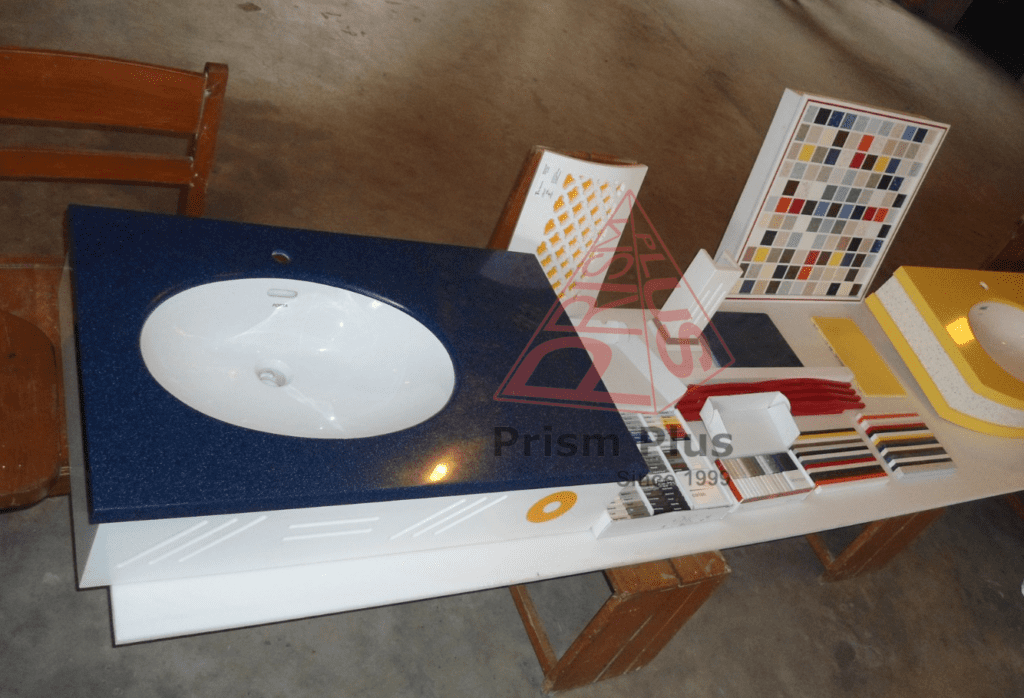Corian vs. Granite Countertops: Which is the Better Choice for Your Home?
When it comes to choosing countertops for your kitchen or bathroom, two popular materials that often come up are Corian and Granite. Both materials have their unique advantages and aesthetic appeal, but the question remains: which is the better option for your home? In this comprehensive guide, we will compare Corian vs. Granite countertops, examining their durability, maintenance, cost, aesthetics, and overall performance to help you make an informed decision.

What is Corian?
Corian is a type of solid surface material created by DuPont. It’s made from a blend of natural minerals and acrylic resins, which results in a non-porous, smooth surface that is easy to clean and maintain. Corian is available in a wide variety of colors and patterns, making it a versatile choice for any home decor. Additionally, Corian is known for its ability to create seamless countertops, which adds a sleek and modern touch to kitchens and bathrooms.
What is Granite?
Granite, on the other hand, is a natural stone that is mined from the earth. It is formed from magma and consists mainly of quartz, feldspar, and mica. This natural material is famous for its unique appearance, as no two slabs are alike. Granite countertops are incredibly durable, heat-resistant, and are often chosen for their timeless beauty. Granite is available in a wide range of colors and patterns, although it can be more limited in variety compared to Corian.
Durability: Corian vs. Granite
When it comes to durability, granite countertops have the upper hand. Granite is incredibly strong and can withstand heavy impact, making it highly resistant to scratches and chips. It is also heat-resistant, so you can place hot pans directly on the countertop without worrying about damage. However, granite is porous, which means it can absorb liquids like water, oils, and wine, potentially causing stains. Sealing granite countertops regularly can prevent this issue, but it still requires periodic maintenance to ensure long-lasting protection.
Corian countertops, while still durable, are not as hard as granite. They are more susceptible to scratches and dents, especially from sharp objects. However, Corian is non-porous, so it doesn’t absorb liquids, making it resistant to stains. If you do manage to scratch Corian, it is possible to repair it by sanding the affected area, which is a big advantage over granite, as granite cannot be easily repaired once damaged.
Maintenance: Corian vs. Granite
Corian is known for its ease of maintenance. Since it is non-porous, you don’t need to worry about sealing it, and cleaning is a breeze. All you need is warm water, mild soap, and a soft cloth to wipe it down. Additionally, Corian is resistant to mold and mildew, making it a great choice for bathrooms.
On the other hand, granite requires more maintenance. Because it is porous, granite countertops need to be sealed to protect them from moisture and staining. The sealing process should be done every 1-2 years, depending on how often the countertop is used. For cleaning, granite countertops can be wiped down with mild soap and water, but you must be cautious about using acidic cleaners, as they can damage the stone.
In terms of overall maintenance, Corian wins hands down due to its low upkeep requirements. Granite requires more attention, particularly when it comes to sealing and protecting the surface.
Cost: Corian vs. Granite
The cost of both Corian and Granite countertops varies based on several factors, such as the color, pattern, size, and the fabricator you choose. However, in general, Corian is less expensive than granite.
Granite countertops are considered a premium material due to their natural beauty, rarity, and the complex process involved in extracting and finishing the stone. The cost of granite slabs can be higher due to the need for specialized installation techniques and the potential for more expensive transport and handling.
Corian countertops are usually priced more affordably, making them a great option for homeowners on a budget. Additionally, the ease of installation of Corian can result in lower labor costs compared to the installation of granite.
In conclusion, Corian tends to be more budget-friendly, while granite can be a more expensive investment upfront, though its durability and natural beauty might justify the cost for some.
Aesthetic Appeal: Corian vs. Granite
When it comes to aesthetics, both materials offer unique advantages, but the choice often comes down to personal preference.
Corian countertops provide a sleek, smooth, and modern look. They can be molded into various shapes and designs, including custom curves and seamless installations. Corian is available in an extensive range of colors and patterns, including solid colors and designs that mimic natural stones. This versatility makes Corian an excellent choice for contemporary kitchens and bathrooms. Furthermore, because Corian can be seamlessly joined, you won’t see any visible seams, which is perfect for those seeking a clean, modern appearance.
Granite countertops, on the other hand, offer a natural, timeless aesthetic. The natural veining and patterns found in granite make each slab unique, giving it an authentic, luxurious look. Granite has a distinctive, high-end appearance that many homeowners associate with quality and sophistication. While granite is available in a wide variety of colors, it may not be as customizable in terms of design as Corian.
If you’re looking for a more traditional, earthy look with natural beauty, granite is the way to go. However, if you prefer a modern, seamless design with an almost endless array of color choices, Corian may be the better fit.
Which is the Better Choice?
So, Corian vs. granite countertops – which one is right for you?
- Choose Corian if:
- You want a modern, seamless look.
- You prefer low-maintenance countertops that don’t require sealing.
- You’re on a budget but still want a stylish countertop.
- You value the ability to easily repair scratches or damage.
- Choose Granite if:
- You’re looking for a natural, timeless beauty with unique patterns.
- Durability and heat resistance are top priorities.
- You don’t mind a bit more maintenance and the cost of sealing.
- You’re willing to invest more for the luxury of a premium material.
Conclusion
Ultimately, both Corian and Granite countertops are excellent options, each with its own set of benefits. Corian offers a more affordable, low-maintenance solution with a sleek, modern aesthetic, while granite brings a natural, luxurious appeal and long-lasting durability. The choice depends on your personal preferences, budget, and the specific needs of your kitchen or bathroom.
By considering factors like durability, maintenance, cost, and aesthetics, you can make an informed decision that best suits your home and lifestyle. Whether you choose Corian for its seamless design or Granite for its timeless elegance, both materials will provide a beautiful and functional surface for years to come.

